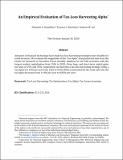An Empirical Evaluation of Tax-Loss-Harvesting Alpha
Author(s)
Chaudhuri, Shomesh E; Burnham, Terence C; Lo, Andrew W
DownloadSubmitted version (1.389Mb)
Open Access Policy
Open Access Policy
Creative Commons Attribution-Noncommercial-Share Alike
Terms of use
Metadata
Show full item recordAbstract
© 2020, © 2020, CFA Institute. Advances in financial technology have made tax-loss harvesting more feasible for retail investors than such strategies were in the past. We evaluated the magnitude of this “tax alpha” with the use of historical data from the CRSP monthly database for the 500 securities with the largest market capitalizations from 1926 to 2018. Given long-term and short-term capital gains tax rates of 15% and 35%, respectively, we found that a tax-loss-harvesting strategy yielded a before-transaction-cost tax alpha of 1.08% per year for our sample period. When the strategy was constrained by the “wash sale rule,” the tax alpha decreased from 1.08% per year to 0.82% per year.
Date issued
2020Department
Sloan School of Management. Laboratory for Financial EngineeringJournal
Financial Analysts Journal
Publisher
Informa UK Limited